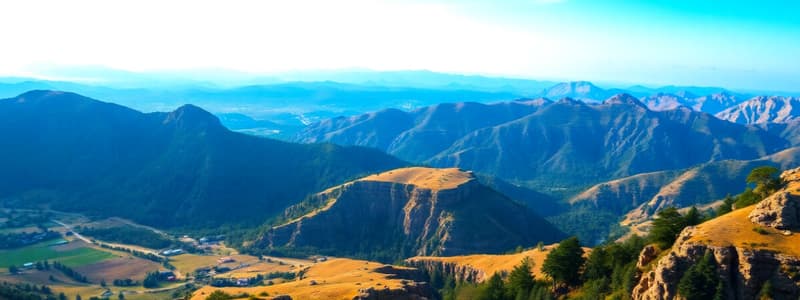Podcast
Questions and Answers
Which branch of geography focuses specifically on natural features and processes?
Which branch of geography focuses specifically on natural features and processes?
- Cultural Geography
- Human Geography
- Geographical Information System (correct)
- Physical Geography
What key concept in geography refers to the unique characteristics of a location, such as climate and culture?
What key concept in geography refers to the unique characteristics of a location, such as climate and culture?
- Movement
- Location
- Place (correct)
- Region
Which of the following best describes Geographical Information Systems (GIS)?
Which of the following best describes Geographical Information Systems (GIS)?
- It combines mapping, statistical analysis, and technology to analyze location data. (correct)
- It focuses solely on political boundaries.
- It is a field that studies the relationships between humans and their environments.
- It relies exclusively on field studies and observation.
Which key concept in geography involves the movement of people, goods, and ideas across different areas?
Which key concept in geography involves the movement of people, goods, and ideas across different areas?
How does geography aid in understanding global challenges such as climate change?
How does geography aid in understanding global challenges such as climate change?
Study Notes
Definition of Geography
- Study of the Earth's landscapes, environments, and the relationships between people and their environments.
Branches of Geography
-
Physical Geography
- Focuses on natural processes and features (landforms, climate, vegetation).
- Subfields: Climatology, Biogeography, Geomorphology, Hydrology.
-
Human Geography
- Examines human activities, cultures, and their impacts on the environment.
- Subfields: Urban Geography, Economic Geography, Cultural Geography, Political Geography.
-
Geographical Information Systems (GIS)
- Combines cartography, statistical analysis, and computer science to analyze spatial data.
Key Concepts
-
Location
- Absolute: Exact coordinates (latitude and longitude).
- Relative: Position in relation to other locations.
-
Place
- Physical and human characteristics that make a location unique (e.g., climate, culture).
-
Region
- Area defined by certain unifying characteristics (e.g., language, climate).
-
Movement
- Refers to the migration of people, goods, and ideas across spaces.
-
Human-Environment Interaction
- Studies how humans adapt to and modify their environment.
Tools in Geography
-
Maps
- Representational tools depicting the Earth's surface features.
- Types: Political, Physical, Topographic, Thematic.
-
Remote Sensing
- Use of satellite or aerial imagery to gather information about the Earth.
-
Field Studies
- Direct observation and analysis of geographical phenomena in their natural settings.
Importance of Geography
- Helps in understanding global challenges (climate change, resource management).
- Aids in urban and regional planning.
- Essential for navigation and transportation systems.
- Facilitates cultural awareness and understanding of global interconnections.
Definition of Geography
- Geography is the study of the Earth's surface, including landscapes, environments, and the relationship between people and their environments.
Branches of Geography
- Physical Geography focuses on natural processes and features like landforms, climate, and vegetation.
- Human Geography examines human activities, cultures, and their impact on the environment.
- Geographical Information Systems (GIS) combines cartography, statistical analysis, and computer science to analyze spatial data.
Key Concepts
- Location refers to the position of a place on Earth.
- Absolute Location is defined by precise coordinates like latitude and longitude.
- Relative Location describes a place's position in relation to other places.
- Place describes the unique characteristics of a location, including its physical and human features.
- Region refers to an area with shared characteristics, such as language, climate, or culture.
- Movement encompasses the migration of people, goods, and ideas across spaces.
- Human-Environment Interaction explores how humans adapt to and modify their environment.
Tools in Geography
- Maps are visual representations of the Earth's surface features.
- Different types of maps include political, physical, topographic, and thematic maps.
- Remote Sensing uses satellites and aerial imagery to gather information about the Earth.
- Field Studies involve direct observation and analysis of geographical phenomena in their natural settings.
Importance of Geography
- Geography helps us understand global challenges such as climate change and resource management.
- It plays a crucial role in urban and regional planning.
- Geography is essential for navigation and transportation systems.
- Studying geography promotes cultural awareness and understanding of global interconnections.
Studying That Suits You
Use AI to generate personalized quizzes and flashcards to suit your learning preferences.
Description
This quiz covers the basic definitions and branches of geography, including physical and human geography, as well as geographical information systems. Test your knowledge on key concepts such as location, place, and region within the study of geography.




